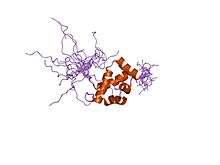CUT domain
In molecular biology, the CUT domain (also known as ONECUT) is a DNA-binding motif which can bind independently or in cooperation with the homeodomain, which is often found downstream of the CUT domain. Proteins display two modes of DNA binding, which hinge on the homeodomain and on the linker that separates it from the CUT domain, and two modes of transcriptional stimulation, which hinge on the homeodomain.[1][2]
| CUT | |||||||||
|---|---|---|---|---|---|---|---|---|---|
 solution structure of the second cut domain of human satb2 | |||||||||
| Identifiers | |||||||||
| Symbol | CUT | ||||||||
| Pfam | PF02376 | ||||||||
| InterPro | IPR003350 | ||||||||
| SCOPe | 1wh6 / SUPFAM | ||||||||
| |||||||||
References
- Lannoy VJ, Burglin TR, Rousseau GG, Lemaigre FP (May 1998). "Isoforms of hepatocyte nuclear factor-6 differ in DNA-binding properties, contain a bifunctional homeodomain, and define the new ONECUT class of homeodomain proteins". J. Biol. Chem. 273 (22): 13552–62. doi:10.1074/jbc.273.22.13552. PMID 9593691.
- Yamasaki, K.; Akiba, T.; Yamasaki, T.; Harata, K. (2007). "Structural basis for recognition of the matrix attachment region of DNA by transcription factor SATB1". Nucleic Acids Research. 35 (15): 5073–5084. doi:10.1093/nar/gkm504. PMC 1976457. PMID 17652321.
This article is issued from Wikipedia. The text is licensed under Creative Commons - Attribution - Sharealike. Additional terms may apply for the media files.